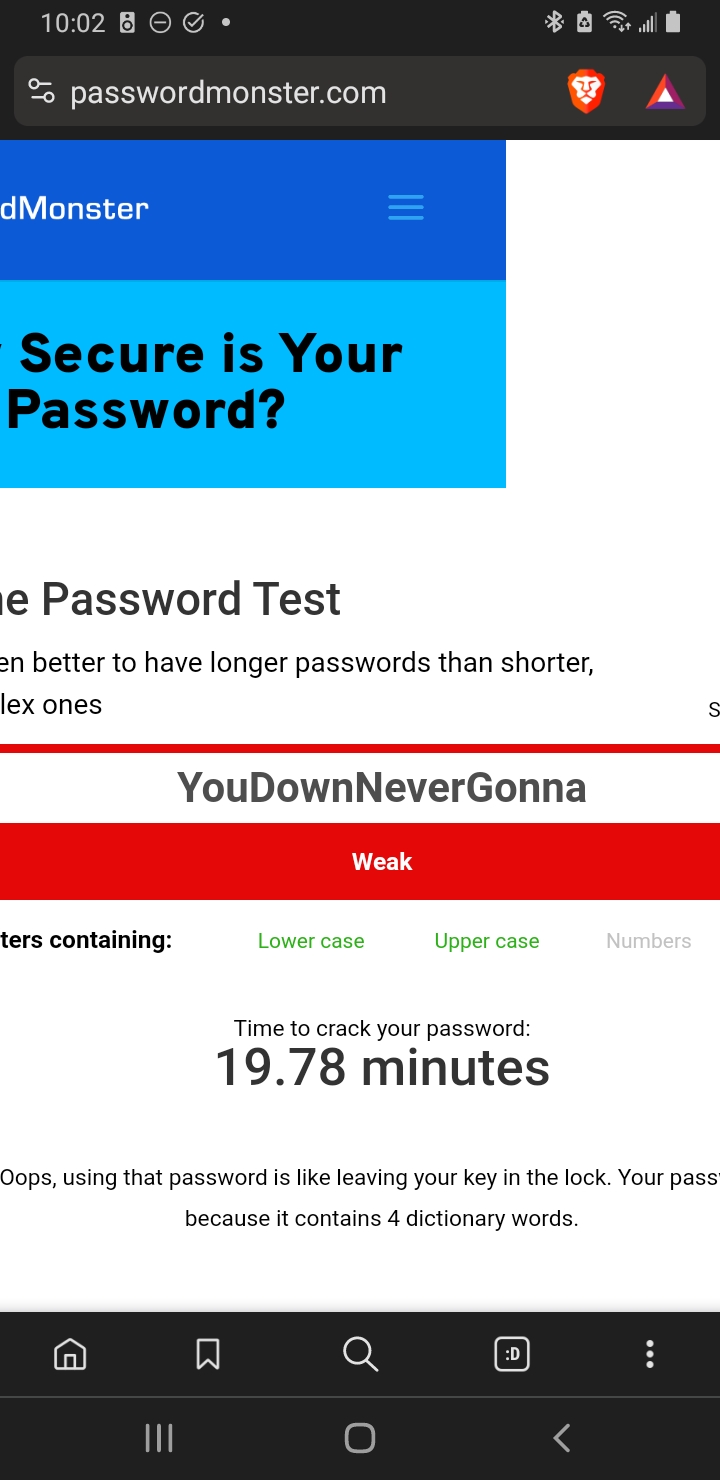A PasswordCard is a credit card-sized card you keep in your wallet, which lets you pick very secure passwords for all your websites, without having to remember them! You just keep them with you, and even if your wallet does get stolen, the thief will still not know your actual passwords.
A very cute idea, well implemented.
Your PasswordCard has a unique grid of random letters and digits on it. The rows have different colors, and the columns different symbols. All you do is remember a combination of a symbol and a color, and then read the letters and digits from there. It couldn’t be simpler!
A chain is only as strong as its weakest link. It’s far safer to pick secure passwords and write them down, than it is to remember simple and easy to guess passwords. You already protect your wallet very well, and even if it does get stolen the thief will still not know which of the many thousands of possibilities on the card is your password.
Defeats the purpose of a password manager for me. Why:
- You still need to remember for every account a secret (color, grid combination)
- Long passwords are impractical
- Password entry is not easy, it is manual
Users are likely to end up using short passwords and are likely to use the same password for multiple accounts.
Not saying it has no use, but not as a replacement for your password manager.
This feels like a weaker version of GRC’s Off The Grid system. https://www.grc.com/offthegrid.htm
It doesn’t require you to remember something different per website. It’s designed so that you can turn any site name (E.g. Amazon) into a secure password which is unique to you. If you really need a completely offline solution, I don’t think it gets too much better than that.
All of these systems are great until you run into “password must be 9-11 characters and contain two symbols from a hidden list of acceptable symbols, which we will not expose to the user but instead only inform you you’ve chosen the wrong symbol”. I can’t see myself relying on a system like this for more than providing a secure password to my digital password manager.
That is quite a nice read. I think I’ll try using this system, as it looks fun. Thanks for that idea.
I’ve never really had a use case for it myself. I’m happy using Bitwarden at present. It’s certainly a fun read and a good solution for anyone in need of a completely offline solution.
I really like how easy it is to customise it so that even if someone got a copy of your square, they wouldn’t necessarily be able to get your passwords. Changing your starting row or column or adding a few characters at the start of the domain will completely change the output. I’d imagine you’d need both the square and multiple passwords to even attempt to brute force a solution back out of it.
This is a terrible idea. It’s negligibly better than writing down the passwords, because it’s trivially easy to try every password represented on this card. Once someone has the card, your entropy is just two characters, which is the two characters you memorize for the site. In effect, you have a 2 character password.
https://github.com/LordDarkHelmet/PasswordCardWordListGenerator
I see what you’re saying. But it’s just a tool. You can use the card for any mapping pattern you like. This GitHub link has a nice animated image, I’ve tried to include it here in line, that shows different options you could use. Giving you more than just a two character password of entropy
Cute idea, but 8 characters is not a good length. Neat if more symbols and longer length card could be generated.
Length of 8 and only a-Z plus numbers 0-9?
That could be cracked in an offline attack in minutes…
Then double it up and use 2 together
Sure, you could…
I printed off one of these YEARS ago, they’re pretty cool! I wonder if I still have it somewhere.
Seems like this is recommending the use of 8 character passwords… Even with upper/lower case letters, numbers, and special characters can’t an 8 character password technically still be brute forced in like 10 minutes?
Yes, if you were using this as a key for a encrypted vaults with nuclear secrets, 8 wouldn’t be sufficient.
But if your using this with online services that implement rate limiting, (or TPM, or Hardware security key), the rate limiting makes this sufficiently complex.
So Bitwarden (rate limiting), hardware security key (something you have), and knowing how to read your password card (something you know). Gets you pretty far in terms of usable security.
Nothing is stopping you from using 16, 32, 64 characters, you just have to come up with a system you like to read the card
Fair enough, all good points! Assuming you are using the 8 character columns as unique passwords, I guess this also promotes the use of different passwords for different accounts which is also a good practice!
Reminds me of: https://www.grc.com/ppp/design.htm
As with many things, this is already a thing. My wife’s old bank had these that you had to use in combination with your password or ATM pin. It worked pretty well, until someone lost the card.
If you like this idea, you can roll your own, but if you use this website, make sure you use a incognito browser so the data doesnt stay on your hard drive after you print it. (tor browser for bonus points)
I use keepass but this is a great idea
Better idea: memorize lyrics to a song, for each website choose a different starting word, use 4 consecutive words as password. You only have to remembered one number per page, you don’t need to print anything and you can have longer passwords.
YouDownNeverGonna
Pretty easy to crack things like that, do you ever check how good your password is?

Seems very easy to crack tbh
Spell the words with mistakes + add numbers and symbols with a rule, capitalize with a rule too
But lyrics of a song is an really obvious target to get to a dictionary(if it’s a dictionary attack)
More interesting would be encrypting name of the service, maybe with you login or something
So “gooey” + “lemmy”, let’s say we take three first letters and three last
“goommy”
Create a dictionary in your head only you know:
go out out mom mom yes (for an example I used short words)
Make mistakes that you would:
go oud oud mam mam yess
Add some numbers and symbols, capitalize
gO Oud Oud mAm mAm yEss (o, a, e are capitalized)
You get the point
Or just use a god damned pw manager. As soon as you have to memorize a system corners will be cut. 16 random characters will never be beaten by a mangled string.
Yeah, but most of the password managers are a security risk too
I would actually be happy to see a good airgapped password manager working with qr codes, or NFC, or something like that
Maybe as an app for an old phone, or a raspberry pi zero
Crack how? With 4-5 words you’re going to have a pretty long password so bruteforce is out. Do you mean that if you will have one of my password you will have the rest? That’s because I gave you obvious example as a joke. What if my password is TakePicturesOfYou. What other password are possible? How will you crack them?
Take the lyrics of the top 1000 popular english songs, and do a rolling hash of 5 words at a time. To account for capitalization, you would have to multiplely the dataset a few times but I bet you most passwords created in this manner would be easily cracked using this method.
That’s not easy. I mean it’s not that hard computationally but you’re talking about very specific attack requiring some dedicated tools. Real life you would have two scenarios:
- You trying to break into my specific account like gmail. This will not help you because they will rate limit you, use captcha and eventually just block you.
- You have a leaked list of thousands/millions password hashes and my password is among them. Hackers would just use existing rainbow tables. They will not think ‘hey, maybe some of those passwords use song lyrics, let’s check’.
This would be bad pretty much only in the very specific scenario of hackers trying to hack my specific account and having leaked hashes of password for this account.
Still I wouldn’t really use this method. I’m just saying it’s better method than some printed card generating short alphanumeric password.
Fair. I guess I’m just being nitpicky.
I currently use LessPass to generate my passwords. This seems like a similar solution but even easier because you no longer need to access a website or install an app or extension. Thanks for sharing this.
Seems like they at least could’ve made the page have a no-cache header so you don’t have to wipe the cache & history by hand.
Oh, I thought it was a smart card





